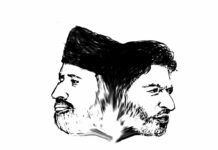 Masood Hussain
Masood Hussain
Since Mufti Sayeed breathed his last in AIIMS, the suspense show is on for around two months. With 86 of its 87-lawmakers alive and kicking, J&K is ruled by governor. If uncertainty prolongs N N Vohra may have to appoint many advisers to run the sensitive state.
Governor’s administration is apparently working well. The overall governance has seemingly improved, files are moving fast, policy decisions are not delayed, attendance in offices has improved and resources are being arranged and spent. The deserted civil secretariat, however, indicates that governor’s rule is no substitute to an elected government.
With nobody in a position to foresee happenings, Omar Abdullah has already asked his cadres to get into election mode. Not willing to join hands with BJP in case the ‘north pole – south pole’ alliance falls apart, Omar sees midterm poll as the only viability.
After coming out of the mourning, PDP president Ms Mehbooba started the process of reviewing her father’s last 10 months. She neither disowned the alliance nor dissociated from the common minimum programme. She, however, wanted certain parts of the common agenda be prioritized for implementation. And that is where the process halted.
Once PDP linked its assurances with government formation, it was the BJP turn now. Though the local BJP continues to be desperate for government formation, like their PDP counterparts, it was BJP’s central leadership that started showing cold shoulders. If reports coming from Delhi are any indication, the latest process of reviving the moribund process ended in a fiasco with BJP suggesting that PDP should form the government and the issues could be tackled later.
In reaction, Ms Mufti flew to Jammu, the BJP vote-bank, to make her stand clear. She told her party lawmakers that she is being told her flock is going astray. Even if it comes to that, she told them, she would prefer to stay alone and struggle. Later, she made a public speech reiterating that she will be the last person to opt for government for the sake of government because she has public interest as the priority. The ‘public interest’ has already been detailed and comprises some five points related to energy, human rights and the foreign affairs.
Neither of the two parties is annulling the accord. In this fluid situation, seemingly, the situation has reached a point that trust is the casualty. BJP wants implementation of the agenda of alliance, so does PDP. The only difference is that PDP wants parts of it to be put on fast forward mode, which BJP sees as blackmail.
Will BJP’s central leadership take its core support belt seriously and accommodate PDP? If not, can PDP eventually eat its words and get into ruling mode and manage the pressure that is building within the party? Costs are quite huge for both. But PDP being a small, regional and emerging party has three major costs. Firstly, how to seek a fresh mandate when it messed the last one? Secondly, how will it manage its credibility of taking alliance vows and then breaking it? It deserted Congress in 2008 and now BJP in 2016. Thirdly, section of its lawmakers thinks they lack both courage and resources to show up in their areas and seek votes. Some claim that they even lack resources.
To manage all this, even if the two parties manage government formation, how will they manage the trust deficit that they contributed to? So is a midterm poll an alternative or an all party government?















